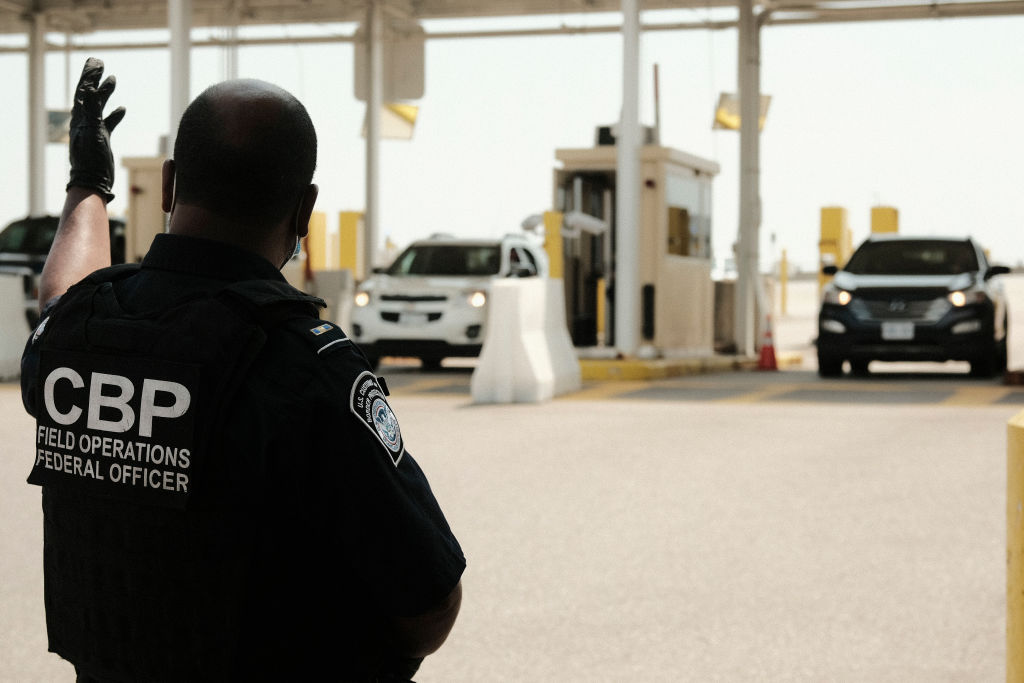
DETROIT, MI - AUGUST 09: U.S. Customs and Border Protection agents direct vehicles re-entering the U.S. from Canada, which has opened its borders to U.S. citizens who can provide proof of vaccination and a negative Covid-19 test, for random searches and inspections at the Ambassador Bridge Port of Entry August 9, 2021 in Detroit, Michigan. The border had been closed to non-essential travel since March 2020. (Photo by Matthew Hatcher/Getty Images)
The White House has confirmed the U.S. land and air border will officially open to fully vaccinated Canadians on Nov. 8.
Assistant Press Secretary Kevin Munoz confirmed the news in a tweet, that all foreign national travelers will have to be fully vaccinated to travel to the U.S.
BREAKING: White House Assistant Press Secretary confirms US border reopening to fully vaccinated travelers on November 8th #cdnpoli https://t.co/N4ETQxxCcZ
— Cormac Mac Sweeney (@cmaconthehill) October 15, 2021
It was announced earlier this week the land border would be reopening after being closed since March 2020 due to the COVID-19 pandemic.
Proof of vaccination will be required, but it’s not clear if that includes mixed doses. Vaccines approved by either the U.S. Food and Drug Administration or the World Health Organization will be accepted, the Centers for Disease Control and Prevention confirmed this week.
The Centers for Disease Control and Prevention is currently working on the operational details, such as what will constitute acceptable proof and which “very limited” exceptions might be allowed.
New York congressman Brian Higgins has written to the CDC to urge the agency to promptly clarify its stance on mixed-dose vaccines.
“The prospect of millions of Canadian travellers being indefinitely denied access to the United States … is deeply concerning,” Higgins says in Thursday’s letter to CDC director Dr. Rochelle Walensky.
“Our livelihoods and way of life depend on the free flow of goods, services and people across the border – often multiple times per day.”
A report from Bloomberg News says the White House will consider people with mixed doses as fully vaccinated.
Among those left frustrated by the piece-by-piece information being shared with Canadians is Paul Combden.
He received mixed vaccinations and is still waiting to hear if he can travel from Newfoundland to the U.S. in the next few weeks for a wedding.
“There’s no one we can call in the government, nobody answering emails,” he said about the silence on a national plan from Ottawa.
He is asking the prime minister to be more transparent about what Canada is doing to ensure Canadians are not punished for taking the first vaccines offered to them.
Each time there is a small amount of details being shared about cross-border travel, Combden says he is just left with more answers.
“I’m a first responder and I was advised to get [AstraZeneca) in the beginning when it came out and now I have been on hold with my travel plans,” he said Friday morning.
Adding, “it’s time now that our elected officials have something done about this.”
“It seems like to me like this has been placed on the back burner, like it’s been so slow. They have had vast amounts of time to work on this. The study’s out. The WHO had approved this months ago about mixed vaccination,” he said.
The U.S. Travel Association has estimated the Mexican and Canadian border closures have been costing American businesses $1.5 billion in travel exports – domestic spending by foreign visitors – every month.
Since Homeland Security Sec. Alejandro Mayorkas announced the U.S. plan to ease land-border restrictions this week, would-be travellers and business groups on both sides of the border have been pressing Ottawa to eliminate the need for a costly COVID-19 test in order to cross into Canada.
However, Canadian health officials confirmed Friday those requirements are still under review, and that they would remain for the time being.
“As always, we continue to look at the scientific evidence and results of our current testing regime at the border, which does include the requirement for a negative PCR test within 72 hours prior to coming to Canada,” Deputy Chief Public Health Officer Dr. Howard Njoo said Friday. “What I think is interesting is that, based on the data we’ve been able to analyze to date, there’s still a certain percentage — about 0.2 per cent I think last time I looked at the data — of fully vaccinated travellers coming to Canada that have tested positive for COVID-19.”
Canada Chief Public Health Officer Dr. Theresa Tam echoed the need for vigilance.
“We are in a situation in Canada where our health systems are still very fragile. We need to take a precautionary approach in the next little while, and we’ll continue to evaluate the situation,” she said during a COVID-19 briefing Friday. “Some of the most important things we’re trying to achieve are keeping kids at school, keeping people at work, and keeping the levels of COVID-19 low as our vaccination … coverage is still going up.”





